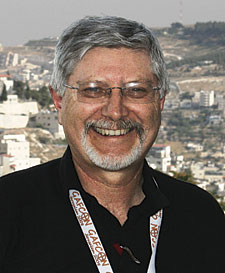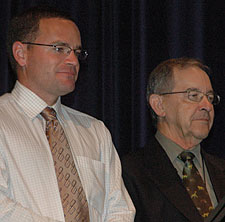 Archbishop Peter Jensen presented Bishop David Mulready with a cheque for $25,000 at Synod Mission Hour last night to help support the work in the Diocese of North West Australia.
Archbishop Peter Jensen presented Bishop David Mulready with a cheque for $25,000 at Synod Mission Hour last night to help support the work in the Diocese of North West Australia.
The Bishop of North West Australia, David Mulready thanked the Synod for their annual grants of $60,000 plus a special $25,000 given this year to support the employment of assistant ministers in the Diocese.
Sydney Diocese has a long history of supporting the Anglican churches in the evangelical Diocese of North West Australia, and mention was made at Synod last night that 16 of the 22 ministers in the Diocese are originally from Sydney.
"We still need more ministers and I have a bus waiting outside in Pitt Street ready to take those who would like to come," joked Bishop Mulready to the Synod.
"We need people who might come for anything from a couple of months up to a couple of years. We are also looking for people who might relocate their work or retire to North West Australia so they can serve in ministry with us."
Bishop Mulready thanked Sydney Anglican churches such as Dapto and Springwood, which have sent short-term mission teams to North West Australia this year.
He said the big challenges in the diocese are "distance and isolation… and mobility of the congregations".
"The church in Broome is 600kms from its nearest neighbour Port Hedland so isolation is a big issue," Bishop Mulready says.
"Another big challenge is that congregations have a turnover of 50 per cent. The population in Port Hedland, for example, is 16,000 and we have 8,000 people leaving and a different 8,000 coming in each year. That means you need new wardens and other leaders almost every year."
Only three parishes in the Diocese are self-supporting, and Bishop Mulready thanked God for Sydney Diocese and mission agencies like Bush Church Aid for their prayerful and financial support.
PTC proclaimed world wide
Current Bishop of Georges River and former CMS NSW General Secretary, Peter Tasker hosted Mission Hour again this year, and following his interview with Bishop Mulready Bishop Tasker introduced a half-hour segment about Moore College's Preliminary Theological Certificate.
 Moore College External Studies Department director, the Rev Gary Nelson, addressed the Synod on the growth of the Preliminary Theological Certificate in Australia and over the world.
Moore College External Studies Department director, the Rev Gary Nelson, addressed the Synod on the growth of the Preliminary Theological Certificate in Australia and over the world.
Mr Nelson revealed that in 1945, when External Studies began at Moore College, there was twice the number of external studies students as full-time students " 70 to 35.
"In 2008 that number has grown to over 5,000 " 15 times as many external students to full-timers. You can see who's had the bigger growth!" announced Mr Nelson, cheekily.
Mr Nelson shared about his experiences at GAFCON and how the trip enlarged his vision for the need for theological education around the globe.
"After talking with many people from many countries I am even more convinced of the strategic importance of our external studies course for world mission," he says.
"We have a sound biblically-based course, grounded in the gospel" there are few courses that can match what we have to offer."
The external studies course has been translated into Spanish and Chinese, and current translations in progress include a simplified Chinese script, Hausa for use in Nigeria/West Africa, and numerous Indian languages.
"We are currently investigating translation projects in Arabic, French, Swahili, Indonesian and Korean," Mr Nelson revealed.
Moving to Mexico
 New CMS missionary to Monterrey, Mexico, the Rev Peter Sholl, shared with the Synod how he and his wife Sarah will be based in north-east Mexico from 2009 with their three daughters, Karina (eight), Lucy (six) and Miriam (four).
New CMS missionary to Monterrey, Mexico, the Rev Peter Sholl, shared with the Synod how he and his wife Sarah will be based in north-east Mexico from 2009 with their three daughters, Karina (eight), Lucy (six) and Miriam (four).
The former rector of St Matthew's, Ashbury will become the director of MOCLAM (Moore College en Latinoamérica).
MOCLAM is currently run by CMS associates Graham and Patty Scarratt, who were missionaries to Chile in the 1980s and 90s and who now run the course remotely from Kiama.
"My job is to pick up what they are doing and keep going with it," Mr Sholl says, adding that the potential for PTC in Latin America is huge.
"There are huge numbers of clergy, student workers and Bible study leaders for whom the course is exactly what they need to give them a firm theological foundation, so they themselves can live more godly lives but also encourage those under their care to do so as well," he says.
Mr Sholl shared how the International Fellowship of Evangelical Students in Latin America have invited him to work out how PTC courses can be used as a standard training package for their hundreds of staff workers.
"In the past four years I've been involved with teaching the PTC course in Kenya and South Africa" it's a fantastic course and people all over the world, including Latin America, are benefiting greatly from us sharing it with them," he says.
Pardon his French
 CMS's first ever missionaries to France, Owen and Catherine Chadwick, arrived in Paris 18 years ago and have finally returned to Sydney to settle. Mr Chadwick shared his experiences at Synod in the final session of Mission Hour last night..
CMS's first ever missionaries to France, Owen and Catherine Chadwick, arrived in Paris 18 years ago and have finally returned to Sydney to settle. Mr Chadwick shared his experiences at Synod in the final session of Mission Hour last night..
The Chadwicks’ primary ministry was to university students serving on-campus with the Groupes Bibliques Universitaires (GBU) in Paris, and then Toulouse.
Mr Chadwick's passion for France dates back to 1983 while he was a student at Moore College.
"France was a Catholic country and a wealthy nation but not much was happening among students, and the huge opportunity to reach young people coming from other countries to study in France was being missed," he says.
Mr Chadwick says France is a post-Christian country where the authority of the Scriptures has been replaced with human reason.
"Take for example France's idea of the place of religious belief in public life. In French schools, debate about faith in God is totally illegal. The flow-on effect of this marks university life," Mr Chadwick reveals.
"In March earlier this year I was putting up a poster on the noticeboard at one of the Toulouse campuses advertising a dialogue meeting in a café off campus. A student came and tore it down again under my very nose. When I challenged him he said the Bible had no place at university " that it belonged in the private sphere."
However, Mr Chadwick says the greatest challenge has been raising up French men and women to be gospel workers themselves.
This is why eight years ago Mr Chadwick borrowed from the MTS training model and formed Relay, an apprenticeship training strategy designed for students who may not have seriously considered vocational ministry before, but who are willing to try it out for a year.
Mr Chadwick revealed that 18 young people have completed this apprenticeship so far and another five commenced the program this year.
"It's about sharing in the joys and challenges of Christian ministry. We believe that a heart for Christian ministry is more "caught' than "taught' in the classroom. It's infectious," he says.
"Our job was to help French Christian leaders to think outside of their frame of reference. We modeled something completely different, which has taken root and is now working well.
"I might add that it wasn't until we had been there for ten years that we had earned enough trust with the local leaders to be able to pull it off. Building confidence with people was everything."























